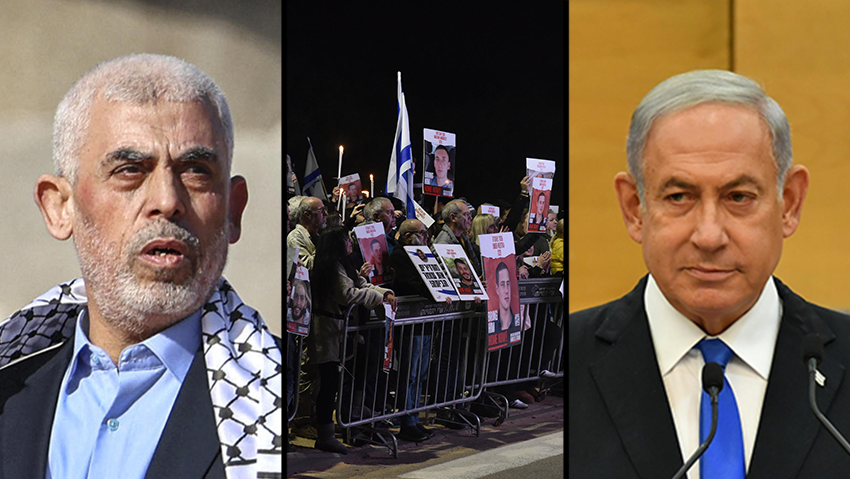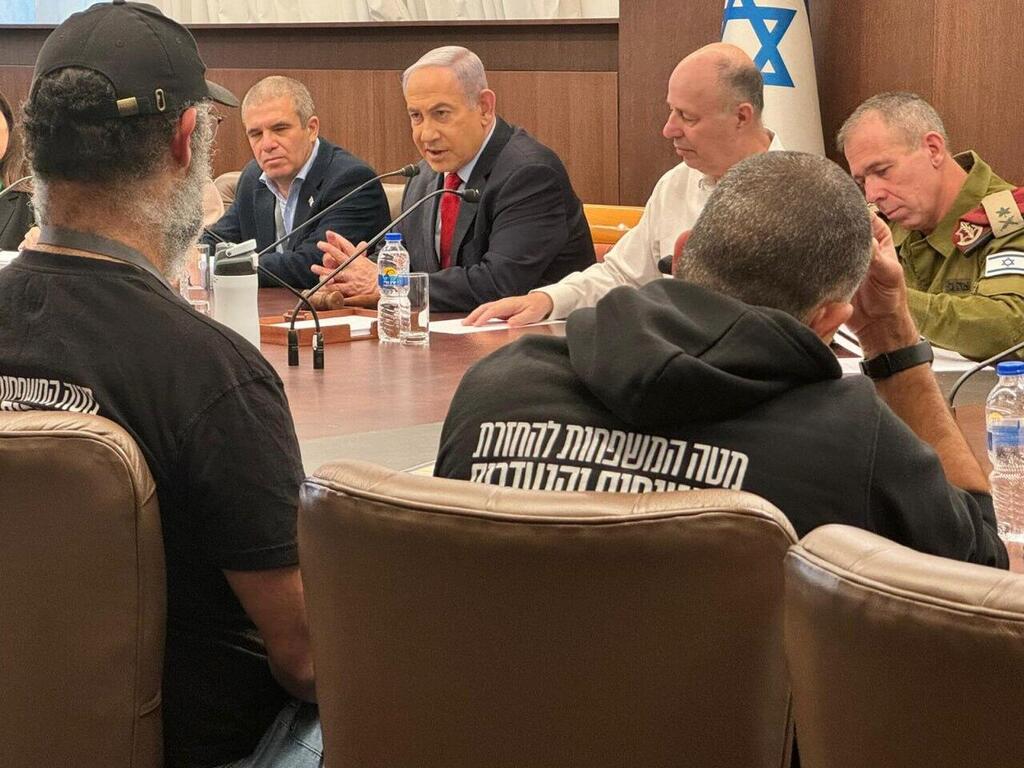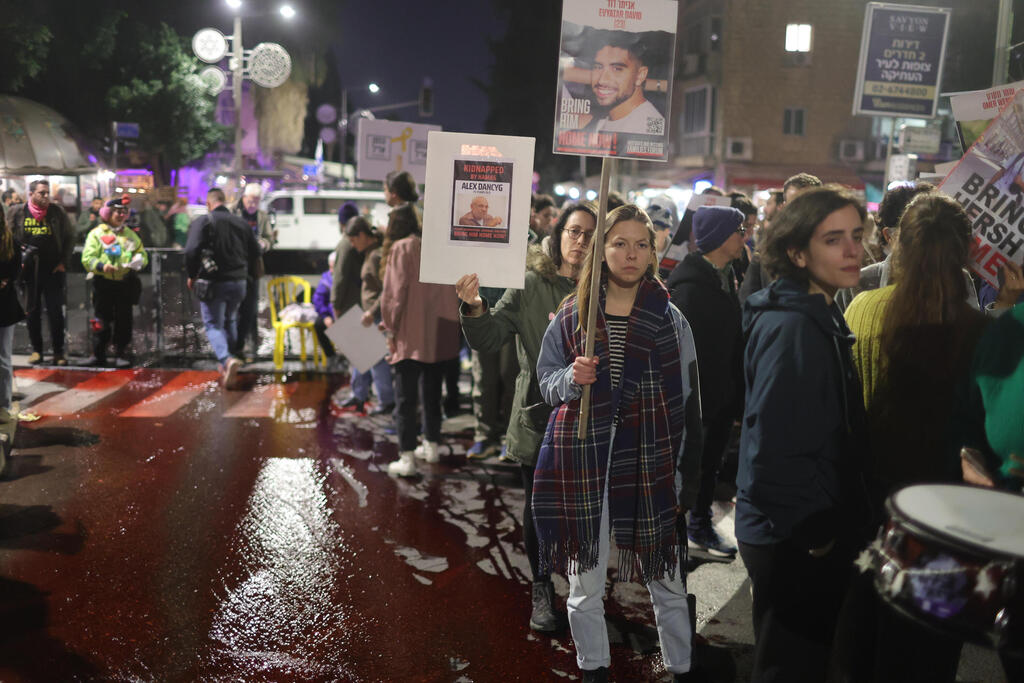Getting your Trinity Audio player ready...
While Prime Minister Benjamin Netanyahu told representatives of families of hostages held in Gaza on Monday "there is no genuine offer from Hamas" for a deal for the release of their loved ones, but rather an Israeli initiative he did not elaborate on, Ynet has learned that behind the scenes, efforts are underway on a framework that could lead to the return of hostages.
Read more:
According to the potential framework, Israel is required to alter its troop deployment within the Gaza Strip for a certain period - something it has not agreed to so far. Additionally, the framework includes a longer cease-fire than the week-long one in the previous deal, and the release of hostages would be phased - initially releasing women and older men, followed by younger men, and then soldiers and bodies. Moreover, Israel is asked to undertake a larger prisoner release, including prominent prisoners involved in the murder of Israelis.
3 View gallery


Hamas leader in Gaza Yahya Sinwar and Prime Minister Benjamin Netanyahu
(Photo: Ido Erez, Sharon Zur, Eli Mandelbaum)
The mediators have informed Israel that there appears to be flexibility on the part of Hamas, recognizing that Israel will not guarantee an end to the war. Israel has sought clarifications from Qatar and expects to receive responses shortly. Israeli officials are not yet certain if Hamas will back down, and at this stage, "there are only beginnings of a framework being woven."
As part of the proposed outline, Israel is required to show considerable flexibility in the duration of cease-fires, the number of prisoners to be released and in altering military deployment.
As Israel is not prepared for a cease-fire, mediators are proposing extended pauses to Hamas, allowing the organization some breathing room. The mediators indicated that Hamas might be open to discussing these pauses, but there is no clear response yet on whether it will abandon the idea of a cease-fire, which Israel is not ready to accept.
A source involved in the indirect negotiations between Israel and Hamas told the Arab news agency AWP, "Negotiations continue, and there are attempts to bridge the significant gaps." The source explained, "There is a chance for an agreement, but it won't happen immediately or soon," and that the current focus is on bridging the differences between the parties.
According to the source, "There are attempts to mediate on multiple levels, conducted consistently and aiming in the same direction. The Egyptians and Qataris are trying, under international auspices, to narrow the gaps in the negotiations."
The source noted that Hamas has set a "high bar" that Israel believes is unfeasible, especially regarding ending the war and halting all military operations. Israel expected Hamas to partially concede on this demand, but the group does not want to lose all its bargaining chips.
The source further said that Hamas understands its current "trump card" is the Israeli hostages and releasing them would leave it with no negotiation leverage, hence its "high bar" of demands. They added, "Ultimately, we believe an agreement can be reached that will reduce the intensity of military actions in Gaza in stages, so that the deal will occur in more than one phase, not all at once."
In a meeting with representatives of families of hostages on Monday, Netanyahu said that Hamas leader in Gaza Yahya Sinwar is hoping for international pressure to end the war.
"He hoped Hezbollah would save him and realized it won't. He hoped Iran would and realized it won't. He hoped the Houthis would, and they won't either. He's hoping international pressure will save him - we are working to ensure it doesn't," Netanyahu said, according to attendees at the meeting.
Netanyahu reiterated in the meeting that there was no genuine offer from Hamas, and reports on the subject were inaccurate. According to him, there is a current Israeli framework presented through a mediator, and Jerusalem was waiting for a response.
He stated that Israel is ready for concessions, likely related to a massive release of prisoners. Netanyahu claimed there is a united front in the Cabinet on this issue despite surrounding chatter, and a military rescue operation is not on the table. He said that as military pressure intensifies, there is a high likelihood of Hamas accepting Israel's initiative that has been laid on the table.
As for cease-fire talks, Netanyahu said that the far-reaching demands set by Hamas would not pose a problem, but Israel cannot break a promise.
"If we agree to end the war, we'll have to sign international guarantees we can't break," he said. He explained that the International Court in The Hague accuses Israel of genocide, complicating a potential cease-fire and subsequent renewal of fighting. Strategically, he noted Hamas is isolated, realizing Hezbollah, Iran and partially Qatar are not fully supportive.
Netanyahu was recorded in the meeting addressing the current situation, "There is no genuine offer from Hamas, contrary to what is said. That is incorrect. I'm stating this bluntly. However, yes, there is our proposal - my proposal - which I also presented in the war cabinet. I've passed it on, and now there's a 'tug of war'.
“Can we bring them to a point where they consider our proposal? That's what's happening these days, even at this hour. We're ready to do many things, but there are things we're not prepared to do, and I said this very clearly yesterday. I can't give details - but it's something we've conveyed to the mediators. It's our initiative. I think if it's clear we have a strong front - there's a good chance it will be accepted."





